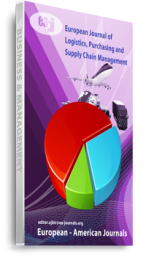The purpose of this study was to examine the role of sustainable procurement practices on the supply chain performance. The study adopted a case study research design. The target population of interest in this study consisted of staff members at EAPCC headquarters in Machakos County. This research adopted a stratified random sampling technique in selecting the sample. The study used primary data, which was collected through use questionnaires. The study also made use of secondary sources of information. Data was classified, tabulated and summarized using descriptive measures while tables were used for presentation of the findings. Pearson’s correlations coefficients was run to examine the relationship between the independent and the dependent study variables that are set out in the objectives of the study.The study findings indicated that 76.3% of change in Supply Chain Performance at EAPCC can be explained by four variables namely Procurement Preferences and Reservations, Green Procurement Practices, Supplier Involvement and Electronic Procurement. According to the research findings, sustainable procurement practices at EAPCC had been fully implemented. Effects of Procurement Preferences and Reservations, Green Procurement Practices, Supplier Involvement and Electronic Procurement were found to be statistically significant with a positive impact on supply chain performance. The study recommends that it is imperative that organizations start to view sustainable procurement as strategic in value. Following the results of the study, it is evident to conclude that there is a positive relationship between Sustainable Procurement Practices and Supply Chain Performance. Through procurement preferences and reservations, adoption of green procurement practices, involvement of suppliers and the use of integrated procurement systems, EAPCC has continued to be at the heart of Kenya’s economic success story.
Keywords: Electronic Procurement, Green Procurement, Preferences and Reservations, Supplier Involvement, Supply chain management, Sustainable Procurement

